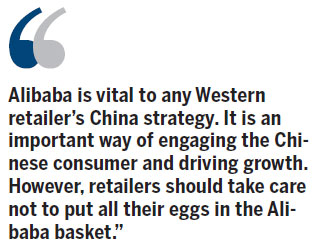Don't put all your eggs in Alibaba's basket
Updated: 2014-10-10 05:47
By Stefan Schmidt(HK Edition)
|
|||||||||
In one of the most hotly anticipated IPOs of recent years, Chinese e-commerce giant Alibaba listed on the New York Stock Exchange earlier this month.
It is the next step in a 15-year journey that has seen the Hangzhou-based company blossom into the world's largest online retailer - bigger than Amazon.
For Western retailers, on the face of it at least, Alibaba is a godsend. With analysts predicting as many as 500 million Chinese could enter the global middle class over the next decade; the e-commerce platform is a secure, reliable way of establishing a beachhead in the region and selling products and services to this rapidly expanding consumer market.
According to accountancy firm KPMG, more Chinese consumers engage in online shopping than anywhere in the world.
However, e-commerce in China has some key characteristics and requirements for other markets. For example, the Chinese consumer typically prefers to pay upon receipt of their goods rather than in advance, adding a layer of complexity to billing and transactions. Simplified Chinese and its vast number of characters are also challenging to integrate into a web platform. This is why many retailers look to Alibaba as a default; a ready-made, turnkey solution that sidesteps the quirks of the Chinese marketplace.
Despite its clear benefits, Alibaba also poses a number of risks to e-retailers looking to grow a share of mind and revenue in China, particularly those with an established footprint and an international brand presence.

For example, if a company elects to open a Web store on Tmall, Alibaba's popular B2C platform, its ability to manipulate the look and feel of the user experience is limited. E-retailers that rely on a strong, vibrant brand identity to drive sales - fashion, luxury goods, food and beverages - often complain that Alibaba restricts their ability to create an online experience which surprises and delights consumers as a dedicated website can.
The growth of mobile purchasing - via smartphone, tablet, phablet - further exacerbates such issues.
China is the world's largest smartphone market. In 2013 its consumers purchased in excess of $27 billion worth of goods via mobile devices. If a retailer relies on Tmall, it allows Alibaba to disintermediate its relationship with its mobile customer base. This means that it loses control of vital customer data, its carefully designed brand experience and the opportunity to directly manage and influence the consumer's path-to-purchase.
The rise of multi-channel shopping has driven the explosive growth of omni-channel commerce solutions. These are platforms that join up the consumer journey seamlessly across channels like mobile, in-store, website, social media, contact centre, ensuring the customers' experience of a retailer - the price point, look-and-feel, content - is consistent, contextual and relevant.
It is by following an "owned" omni-channel strategy alongside a robust Alibaba presence that leading brands have thrived in China so far.
Product and inventory management is also an important component of a robust omni-channel commercial strategy. For retailers with multiple sites in different markets and languages, the ability to update product information, which auto-updates in real-time in any location, on any device, is enormously powerful. Some platforms offer integration with Alibaba so status and stock data is automatically synchronized with, and updated on the Tmall storefront in real-time.
Alibaba is vital to any Western retailer's China strategy. It is an important way of engaging the Chinese consumer and driving growth. However, retailers should take care not to put all their eggs in the Alibaba basket. An omni-channel commercial strategy, that helps to manage a series of "owned" channels in the region - Web, mobile, contact centre, social media, even Tmall itself - is a much more powerful alternative, allowing a retailer to build a meaningful audience relationship and brand identity.
The author is the vice-president of Product Strategy at Hybris.
(HK Edition 10/10/2014 page10)